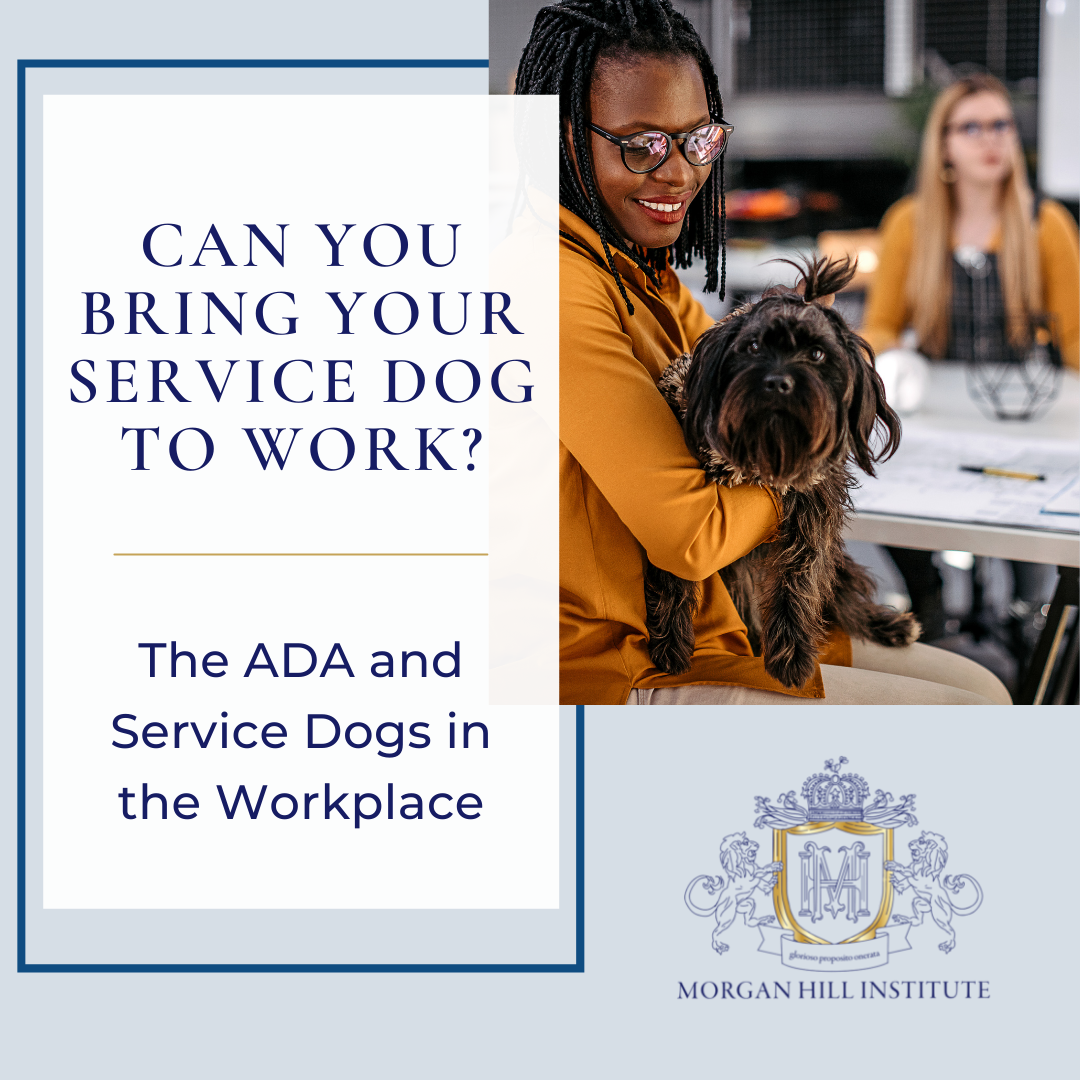Service Dogs and the Law: What Federal Laws Protect Service Dogs And Their Handlers’ Rights?
Individuals with disabilities are protected by multiple laws, most notably The Americans with Disabilities Act (ADA). The ADA and related legislation provide a legal framework for service dogs in the workplace, housing, and travel.
service dogs and The Americans with Disabilities Act (ADA)
The American with Disabilities Act (ADA) is a comprehensive piece of Civil Rights Legislation signed into law by President George H. W. Bush on July 26, 1990. It prohibits discrimination and guarantees that people with disabilities have the same opportunities as everyone else to employment opportunities, goods and services, and government programs and services.
The ADA is considered an equal opportunity law for people with disabilities. It defines a disability as a physical or mental impairment that substantially limits one or more major life activities, a person who has a history or record of such an impairment, or a person who is perceived by others as having such an impairment.
It is divided into five titles:
Employment (Title I)
Public Services (Title II)
Public Accommodations (Title III)
Telecommunications (Title IV)
Miscellaneous (Title V)
The Five Titles of the ada
Title I addresses employment issues. It requires covered employers to provide reasonable accommodations for applicants and employees with disabilities and further prohibits discrimination on the basis of disability in all aspects of employment. Medical examinations and inquiries are also covered under this title.
The US Equal Employment Opportunity Commission regulates and enforces Title I issues. This section applies to employers with at least 15 employees and requires that the employer provides reasonable accommodations to both employees and applicants.
Title II addresses public services and states that services cannot be denied to people with disabilities. In addition, people with disabilities must also not be denied participation in programs or activities available to people without a disability. State and local government agencies, the National Railroad Passenger Corporation, and other commuter authorities fall under this title. Public transportation systems must be accessible to individuals with disabilities.
The US Department of Justice regulates and enforces this title. It requires that public entities such as state and local government make their services, programs, and activities accessible to individuals with disabilities. This includes effective communication with people with hearing, vision, and speech disabilities.
The US Department of Health and Human Services also enforces Title II as it relates to access to programs, services, and activities receiving federal financial assistance. This includes sign language interpreters and other auxiliary aids in hospitals and clinics for effective communication.
Title III addresses public accommodations in places such as restaurants, hotels, stores, and privately-owned transportation systems. It requires that new construction and modifications must be accessible and that existing facilities must remove barriers to services if readily achievable.
The minimum standards for accessibility for alterations and new construction of commercial and privately-owned public accommodations are established in this Title. It further requires that barriers in existing buildings be removed where it is possible without too much difficulty or expense. Adding a ramp to a building only accessible by stairs is a common example. The US Department of Justice regulates and enforces Title III.
Title IV addresses telecommunications. It requires that companies offering telephone services to the general public must have telephone relay services to individuals who use telecommunication devices or other similar devices.
The Federal Communication Commission regulates this title and also ensures that closed captioning is included in federally funded public service announcements.
Title V addresses miscellaneous issues, including the prohibition of threatening or retaliation against individuals with disabilities or those attempting to aid people with disabilities in asserting their rights. It also establishes the relationship between the ADA and other laws. Certain conditions which are not considered disabilities are listed in Title V. These conditions include transvestism, transsexualism, pedophilia, exhibitionism, voyeurism, gender identity disorders not resulting from physical impairments, other sexual behavior disorders, compulsive gambling, kleptomania, pyromania, and psychoactive substance use disorders resulting from current illegal use of drugs.
Homosexuality, bisexuality, and other sexual orientations are also not considered disabilities.
Service Dogs Under the ADA
The ADA defines a service animal as “a dog that has been individually trained to do work or perform tasks for an individual with a disability.” The work or task must be a specific action the dog performs to assist the individual with a disability that is directly related to the person’s disability.
An animal that provides comfort just by being with a person does not fit the ADA standard for a service animal. A dog that provides comfort by being in the room has not been trained to perform a specific task.
Training to perform a specific task is a key part of meeting the definition of a service dog under the ADA. However, who provides the training is not specified. The dog can be solely trained by the handler or by a professional dog trainer. Service dogs in-training are not covered by the ADA.
Verification of Service Dog Status under the ada
The ADA does not require that a service dog wear any identifying items, such as a vest, ID tag, or specific harness. If it is not obvious that a dog is a service animal, employees at a business may only ask the handler two specific questions:
Is the dog a service animal required because of a disability?
What work or task has the dog been trained to perform?
Employees may not request any documentation or ask for the dog to demonstrate its trained task. The employee is also not allowed to ask the handler questions about the disability, including asking for a diagnosis or condition.
A service dog should be calm, under control, and solely attentive to the handler when in public. A service dog should never be aggressive towards other people or animals.
Access Areas for service dogs under the ada
The ADA states that a service dog can accompany the handler anywhere the public is typically allowed to go. The handler must always be in full control of the dog . The dog must be well-behaved. If the dog is not under control or well-behaved, the business can request that the handler remove the dog despite the ADA.
Some locations are commonly questioned and are often singled out when discussing service animal access.
Service dogs are allowed to accompany their handlers through food lines, salad bars, and restaurants. They may also be in places where food is being prepared or in communal food preparation areas. In restaurants, dogs must remain under the table and are not permitted to be served food.
Service dogs are allowed to stay in a hotel or motel room with their handlers. They cannot be left unattended and the handler must pay for any damage caused by the service dog. Hotels and motels cannot discriminate and must allow the guest to stay in any room those without disabilities can stay in. They cannot charge additional cleaning fees.
Service dogs are allowed in all hospital common areas, waiting rooms, and patient rooms with the handler. If the handler cannot provide care while in the hospital they can arrange for a friend or family member to care for the dog temporarily, such as when the handler is in the operation room. If the handler is unable to arrange for care of the service animal, the hospital may place the dog in a boarding facility until the patient is able to resume care.
Service dogs are allowed to ride in an ambulance with their handler unless the space inside the ambulance is insufficient for the emergency crew to perform their duties. If they are unable to transport the service dog in the ambulance, they must make other arrangements to get the service dog to the hospital.
Religious organizations are exempt from the ADA requirements and may opt to not allow a service dog to enter the building or the property.
The Fair Housing Act (FHA)
The Fair Housing Act prohibits discrimination in housing on the basis of race, color, religion, sex, national origin, familial status, or disability. It is more often applied to renters than homeowners but does also apply to homeowner associations (HOAs). It requires housing providers to make reasonable accommodations in rules, policies, practices, or services when such accommodations are necessary to afford a person with a disability the equal opportunity to use and enjoy a dwelling. This typically means living with an assistance animal at the property despite a no-pets policy or waiving a pet deposit/fee for a service animal.
The following types of housing are not covered by the FHA:
Rental dwellings of four or less units when one of the units is occupied by the owner
Single family homes sold or rented by the owner without the use of a broker
Housing owned by private clubs or religious organizations that restrict occupancy in housing units to their members.
Unlike the ADA, the FHA covers both service animals and emotional support animals. An emotional support animal, also known as a comfort or therapy animal, is any animal the supports emotional well-being or provides companionship that help a person with a disability manage their symptoms. An emotional support animal has not been trained to perform any specific tasks to assist the handler.
An emotional support animal includes dogs, cats, small birds, rabbits, hamsters, gerbils, other rodents, fish, turtles, or other small, domesticated animals that are traditionally kept as pets. Reptiles (other than turtles), barnyard animals, monkeys, kangaroos, and other non-domesticated animals are not considered “common household animals.”
The individual may be required to put the request in writing and provide documentation verifying the handler needs a service animal. A similar process to requesting a reasonable accommodation in a work setting is typically completed. If the handler can demonstrate a disability-related need for uncommon household animal, the housing provider may still grant the reasonable accommodation. For example, a monkey trained to help an individual with paralysis with tasks such as drinking, taking medication, turning lights on/off, and retrieving items may be considered a service animal.
The individual may submit the request for a reasonable accommodation at any time in the rental process. This includes prior to moving in, while living in the housing, and during eviction proceedings.
Landlords may not request the handler’s specific diagnosis or access to medical records. They also may not require that a reasonable accommodation request be submitted in a specific way or on a on a specific form. Any written request meets the standard of the FHA.
Landlords can deny a request for a reasonable housing accommodation if at least one of the following specific conditions are met:
The animal would cause an undue administrative or financial burden to the landlord.
It would require a fundamental alteration of the services provided by the landlord.
The specific assistance animal poses a direct threat to the health and safety of others.
The specific assistance animal would cause substantial physical damage to the property.
These criteria must be applied to the specific assistance animal in question. They cannot deny a reasonable housing accommodation based on assumptions about the animal in general, such as behaviors of specific breeds, type of animal, or a generalized feeling towards dogs/animals.
Air Carrier Access Act (ACAA)
The Air Carrier Access Act is a federal law protecting the rights of people with disabilities when traveling by plane. It addresses both service dogs and emotional support animals. Travelers should check with individual airlines prior to travel to verify current laws and policies.
The act prohibits charging additional fees to transport a service or emotional support animal. The airlines may charge a fee for a transporting a pet or require that it is transported in the cargo hold.
It is important to note that the ACAA is a United States law. It does not apply in other countries. The destination country may have very different standards for service dogs and emotional support animals.
The ACAA was updated in 2020 by the US Department of Transportation and went into effect January 11, 2021. It defines a service animal as a dog that is individually trained to do work or perform tasks for a person with a disability. Emotional support animals are no longer covered by the ACAA. Other noteworthy changes include:
Psychiatric service animals are treated equally to other service animals.
Airlines can use DOT forms to verify the service animal is in good health and has had training. It can also verify that the service animal is able to relieve itself in a sanitary manner while onboard.
Passengers with a disability who are traveling with a service animal may use online check-in options if available to the general public.
Handlers are limited to a maximum of two service animals.
The service animal must fit within the handler’s foot space on the aircraft.
Summary
The three main federal laws covering service dogs are the Americans with Disabilities Act, the Fair Housing Act, and the Air Carrier Access Act. These laws ensure individuals with disabilities have equal access to public services, housing, and travel.
disability rights and service dog expert melissa kaekel
Morgan Hill Institute’s Melissa Kaekel is an expert on disability rights in the workplace and service dogs. Interested in having Melissa consult for your organization or speak to your group, be a guest on your podcast, or be an expert source for a press piece? Learn more about consulting and speaking services here.









